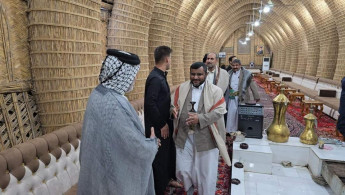Yemen's Houthis open official in Baghdad amid brewing regional tensions
Iraqi officials have confirmed that the Yemeni Houthi group, also known as Ansar Allah, has established an office in Baghdad, in a significant act amidst ongoing regional tensions over Israel's war on Gaza.
The office, located in Baghdad's Al-Jadriya district near the Green Zone and political headquarters, follows reports from local Iraqi media. It is said to have been inaugurated by Abu Idris Al-Sharafi, a prominent Houthi representative with ties to Iraq dating back to 2016.
In response to inquiries, Iraqi security officials were reluctant to confirm the office's opening. However, an advisor to Iraqi Prime Minister Mohammed Shia Al-Sudani clarified to Al-Araby Al-Jadeed, The New Arab's Arabic-language sister publication, "It is not an office or representation as it is being promoted, but a headquarters for movement members who previously stayed in one of the hotels in Baghdad."
The advisor, requesting anonymity, emphasised that Iraq is committed to ensuring that the group does not engage in hostile activities against any country from Iraqi territory.
Last Friday, Abu Idris Al-Sharafi visited a Popular Mobilisation Forces (PMF) headquarters north of Baghdad. In a video, he praised the PMF factions and thanked the "Islamic resistance," commending their efforts amid numerous challenges. He emphasised the unity between the Houthi group in Yemen and the PMF, calling it an "inseparable unit." Additionally, Al-Sharafi visited several southern Iraqi provinces last Saturday, accompanied by PMF leaders, and met with various tribal and religious leaders.
Recently, the Houthi group has also launched several social media platforms, highlighting activities conducted by its members in Iraq. The most notable of these is the Ansar Allah platform on Telegram.
The establishment of the Baghdad office raises questions about Iraq's stance on its relations with Ansar Allah, particularly amid efforts to distance itself from direct involvement in the group's conflicts with Israel and its Western allies.
Mohammed A. Salih, Senior Fellow at the Foreign Policy Research Institute, told TNA, "The framework of Iraq's relations with the Yemeni Houthi group and the status of their presence on Iraqi soil is not clear. Judging from Iraqi media reports and social media, it appears that the pro-Iran Popular Mobilisation Forces (PMF) are the party handling and maintaining the relationship with the Houthis, as both sides define themselves within the broader regional Iran-sponsored 'Resistance Axis'."
"Houthis are deeply engaged in attacks against Israeli and Western interests in the region in response to the ongoing conflict in Gaza. Given such activities by the Houthis and their deep ties with the PMF groups presents a challenge for Iraqi interests as the government in Baghdad strives hard to avoid becoming a party to this conflict and possible future escalations," he added.
Salih also noted that the Iraqi government does not have full control over the country's foreign policy, with Iran-aligned Iraqi armed factions pursuing their own priorities and objectives in regional matters.
TNA reached out to Ahmed al-Sahaf, spokesperson for Iraq's Ministry of Foreign Affairs, but he was not immediately available for comment.
In a provocative move, the Houthi group issued a stern warning to Saudi Arabia against escalating conflicts, threatening retaliatory strikes on vital infrastructure. This warning coincided with the release of drone footage targeting Saudi airports and ports, showcasing the group's capabilities and signalling strategic intent.
The opening of the Baghdad office marks a pivotal moment in the Houthi group's regional strategy, intensifying concerns over stability amidst ongoing conflicts and geopolitical rivalries. Iraq finds itself navigating a delicate balance between national interests and regional dynamics, amidst competing alliances and heightened tensions.
As developments unfold, the Houthi office in Baghdad emerges as a focal point for monitoring future geopolitical shifts in the Middle East.




 Follow the Middle East's top stories in English at The New Arab on Google News
Follow the Middle East's top stories in English at The New Arab on Google News

![A group of Palestinians, foreign and Israeli activists gather to participated in an olive picking event on the land in the town of Battir, which is under threat of confiscation by Israel in Bethlehem, occupied West Bank on 8 November 2024. [Getty]](/sites/default/files/styles/image_330x185/public/2182930803.jpeg?h=199d8c1f&itok=__0LgGsa)
